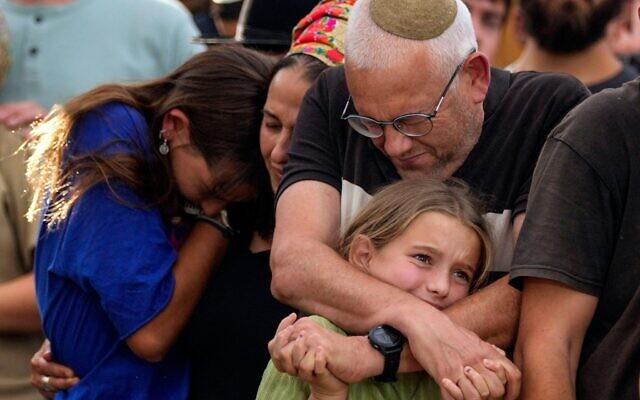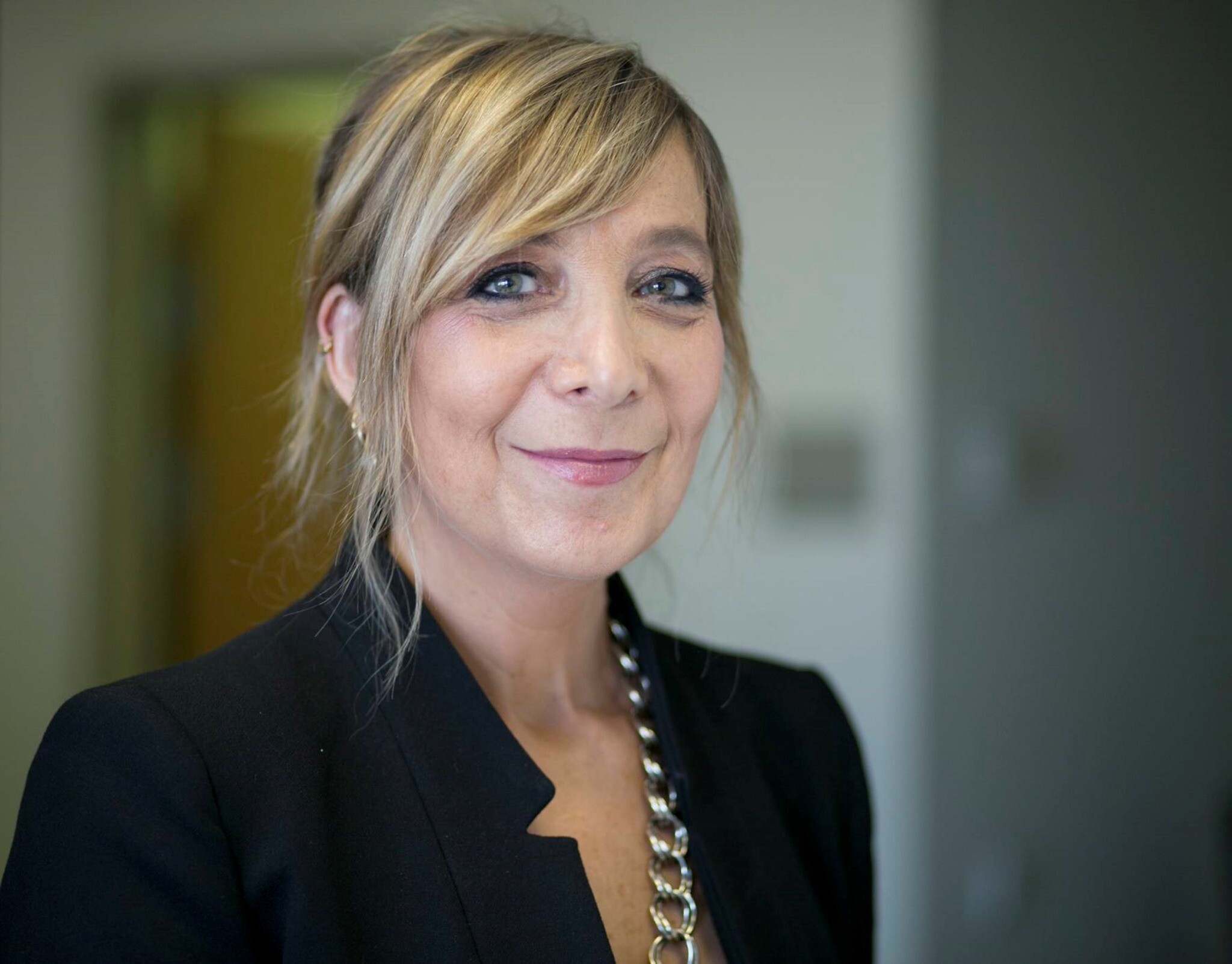Healing a traumatised nation that no longer sleeps at night
The chair of Israel’s national mental health NGO says the huge increase in its workload began the moment Hamas attacked.
Jenni Frazer is a freelance journalist

“If you were writing this as a script”, Emi Palmor tells me, “I would say, this is not going to be a good movie, because it doesn’t make sense, it’s exaggerated. But it’s a real story.”
But Palmor, chair of Natal, Israel’s national NGO specialising in trauma and resilience support, nevertheless relates details of a remarkable new case, to illustrate how almost every sector of society has been affected by the events of 7 October.
“We’ve just accepted a case of a 22-year-old woman who was at the music festival, whose boyfriend was murdered in front of her eyes. She was on the phone for eight hours with her mother, trying to get help, sharing with her everything that was happening, the helplessness of being stuck there and nobody coming to aid her — until her phone battery ran out”.
Now the mother had approached Natal and asked for therapy. “She wasn’t there, she doesn’t live in the south, but [she wanted help] because of the experiences of that day, and having to handle the trauma of her daughter, who was mourning her boyfriend and is completely heartbroken”.
But in what Palmor calls “the craziness of Israeli reality”, the daughter had decided to do her reserve duty in the IDF, serving at one of the army bases which was attacked on 7 October. The mother said that this was part of her daughter’s way of coping, since her boyfriend had served at the same base.

Natal was founded in 1998 and operates throughout Israel with a crack team of professional therapists and psychologists who specialise in trauma and mental health. Initially access is through two helplines, one for veterans of security forces such as the army and police, and the other for victims of terror.
In “normal” times, Palmor says, each helpline would receive about 24,000 calls per year. Each call would last about 20-30 minutes, while the person went through a panic attack or expressed anxiety, whatever they needed to share with the Natal staff.
In the first four weeks following 7 October, the calls skyrocketed — there were 16,000 to 17,000 in just that first month. Many people, says Palmor, were already Natal clients and were calling from 6.30 am from their safe rooms as the Hamas attacks were taking place. “People living in the Gaza Envelope might have suffered from PTSD because of previous rocket attacks; and Natal was the first body to be available, because we work 24/7 and we have the capability and capacity to receive a huge amount of calls.”
By Saturday night, 7 October, Natal already had a webinar ready for parents “in order to support them with the challenges of how to communicate to their children what had been happening.Three hundred parents took part in that webinar, with four of our therapists”.
Those working on the Natal helplines are usually intensively trained for six months or more. Thanks to Covid, Palmor says, helpline volunteers were used to working remotely and more people were trained to staff the helplines —plus new therapists were taken on. “Before the war we had between 300 to 800 people in our clinics. We have now accepted 1,000 new patients who we have referred to one-on-one therapy”.
Palmor, a lawyer who was director-general of Israel’s Ministry of Justice, made it clear that often the therapists themselves needed support. “We had many volunteer therapists from all over the country, who were working with displaced families and who were not themselves trained in trauma intervention. They came to us and asked for help because they were traumatised — just from being in touch with the families and being overwhelmed by the issues they had to deal with.”
Natal’s chief psychologist, Dr Itamar Barnea, was a prisoner-of war during the Yom Kippur War. “He was a pilot who was captured by the Syrians and was tortured for eight months. He suggested that people have to be prepared to get out of our clinics and go and visit the families [of the hostages] in their homes. It’s a completely different approach to therapy and to intervention.”
In what she acknowledged was “a national trauma”, Palmor added that Israelis were beginning to ask themselves what it means to be Jewish.
Anyone exposed to any sort of trauma is likely to apply to Natal for help: from so-called “first responders”, to those who had to gather the bodies from the south, or those who had to tell families of their relatives’ death — or even social workers working with the huge numbers of displaced families. Each situation could trigger trauma and mental health problems, Palmor said.
In what she acknowledged was “a national trauma”, Palmor added that Israelis were beginning to ask themselves what it means to be Jewish. “What about the rise in antisemitism, and what does it mean in terms of Israeli nationality? A lot of Israelis who were not very aware of their Jewish identity in the global context — they could work anywhere, they were from the ‘start-up nation’ — all of a sudden they are very shocked by understanding what it means to be Jewish.”
Natal is learning as it goes along in how to deal with long-term collective trauma, something which Israeli society has never had to face before — although Palmor, as the daughter of a Romanian Holocaust survivor, is well aware that the Jewish people has gone through serious and sustained trauma before now — and has overcome it.
In the first four weeks following 7 October, the calls skyrocketed — there were 16,000 to 17,000 in just that first month.
But she noted that “part of the collective trauma” experienced by Israelis was to do with “one of the weapons used by Hamas — photographing and filming everything that they did and live-streaming it on social media or on direct messaging”. The new thing, Palmor said, was not simply the brutality itself but “a mental health weapon to attack our resilience, to traumatise a nation. It’s a very powerful weapon”.
People in Israel could not sleep at night, Palmor said. She had tried to explain to a non-Jewish friend what had changed in Israeli society since 7 October. “I raised my children in Jerusalem during the bus-bombings and I tried as much as possible to drive them to school so that they didn’t have to use the buses. But sometimes I couldn’t, and in a way you come to accept that it [being the victim of a bus-bomb] might be your fate. But, I told her, now I cannot sleep at night from the thought that my daughter might be raped, tortured and mutilated before she dies. It’s like a risk assessment that we tried to handle and where we trusted our government to protect us. Here, the boundaries that were crossed in terms of cruelty and barbarism… we don’t need to hear the stories, though we do want to hear them. We will have years to learn what happened”.
Natal, however, was both learning from other experiences — such as 9/11 — and helping to create new knowledge on trauma. It had received visits from Ukrainians whom it trained to deal with victims of war with Russia, and had continued to work remotely with them. Natal was also working with first responders in New Jersey and with the National Guard of Wisconsin, and with schools in Germany.
“We are now developing the tools to deal with collective trauma”, Palmor said. “That’s the only thing I can feel confident about, that we have the best and most committed people — and the best intentions.”
• Donations can be made to UK Friends of Natal at PayPal Giving

Thank you for helping to make Jewish News the leading source of news and opinion for the UK Jewish community. Today we're asking for your invaluable help to continue putting our community first in everything we do.
For as little as £5 a month you can help sustain the vital work we do in celebrating and standing up for Jewish life in Britain.
Jewish News holds our community together and keeps us connected. Like a synagogue, it’s where people turn to feel part of something bigger. It also proudly shows the rest of Britain the vibrancy and rich culture of modern Jewish life.
You can make a quick and easy one-off or monthly contribution of £5, £10, £20 or any other sum you’re comfortable with.
100% of your donation will help us continue celebrating our community, in all its dynamic diversity...
Engaging
Being a community platform means so much more than producing a newspaper and website. One of our proudest roles is media partnering with our invaluable charities to amplify the outstanding work they do to help us all.
Celebrating
There’s no shortage of oys in the world but Jewish News takes every opportunity to celebrate the joys too, through projects like Night of Heroes, 40 Under 40 and other compelling countdowns that make the community kvell with pride.
Pioneering
In the first collaboration between media outlets from different faiths, Jewish News worked with British Muslim TV and Church Times to produce a list of young activists leading the way on interfaith understanding.
Campaigning
Royal Mail issued a stamp honouring Holocaust hero Sir Nicholas Winton after a Jewish News campaign attracted more than 100,000 backers. Jewish Newsalso produces special editions of the paper highlighting pressing issues including mental health and Holocaust remembrance.
Easy access
In an age when news is readily accessible, Jewish News provides high-quality content free online and offline, removing any financial barriers to connecting people.
Voice of our community to wider society
The Jewish News team regularly appears on TV, radio and on the pages of the national press to comment on stories about the Jewish community. Easy access to the paper on the streets of London also means Jewish News provides an invaluable window into the community for the country at large.
We hope you agree all this is worth preserving.





















